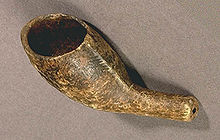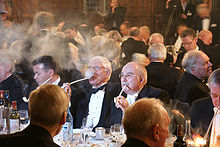Pipe baker

Pipe baker refers to a historical craft that dealt with the production of tobacco pipes from clay .
At the beginning of the 17th century, with the advent of tobacco consumption, the handicraft came to Germany via England and the Netherlands . A special so-called pipe clay was used as the material, which was white in color after firing. The Westerwald was one of the most important centers for handicrafts in Germany . The heyday of this craft came to an end in the middle of the 18th century. The wealthy pipe smokers began to smoke tobacco no longer from simple clay pipes, but increasingly in pipes made of sepiolite ( meerschaum ), porcelain, wood or valuable materials such as silver or glass. The clay pipe remained only as a smoking instrument of the "common man". In the 19th century the triumphant advance of the briar pipe and the cigar finally drove the craft into insignificance. At several traditional commercial and civil events in northern Germany, B. at the Schaffermahlzeit in Bremen , the Westerwald clay pipes are still smoked, here now as a sign of distinction .
literature
- Martin Kügler: clay pipes . Hanusch & Ecker Verlag, Höhr-Grenzhausen 1987. ISBN 3-926075-00-7

